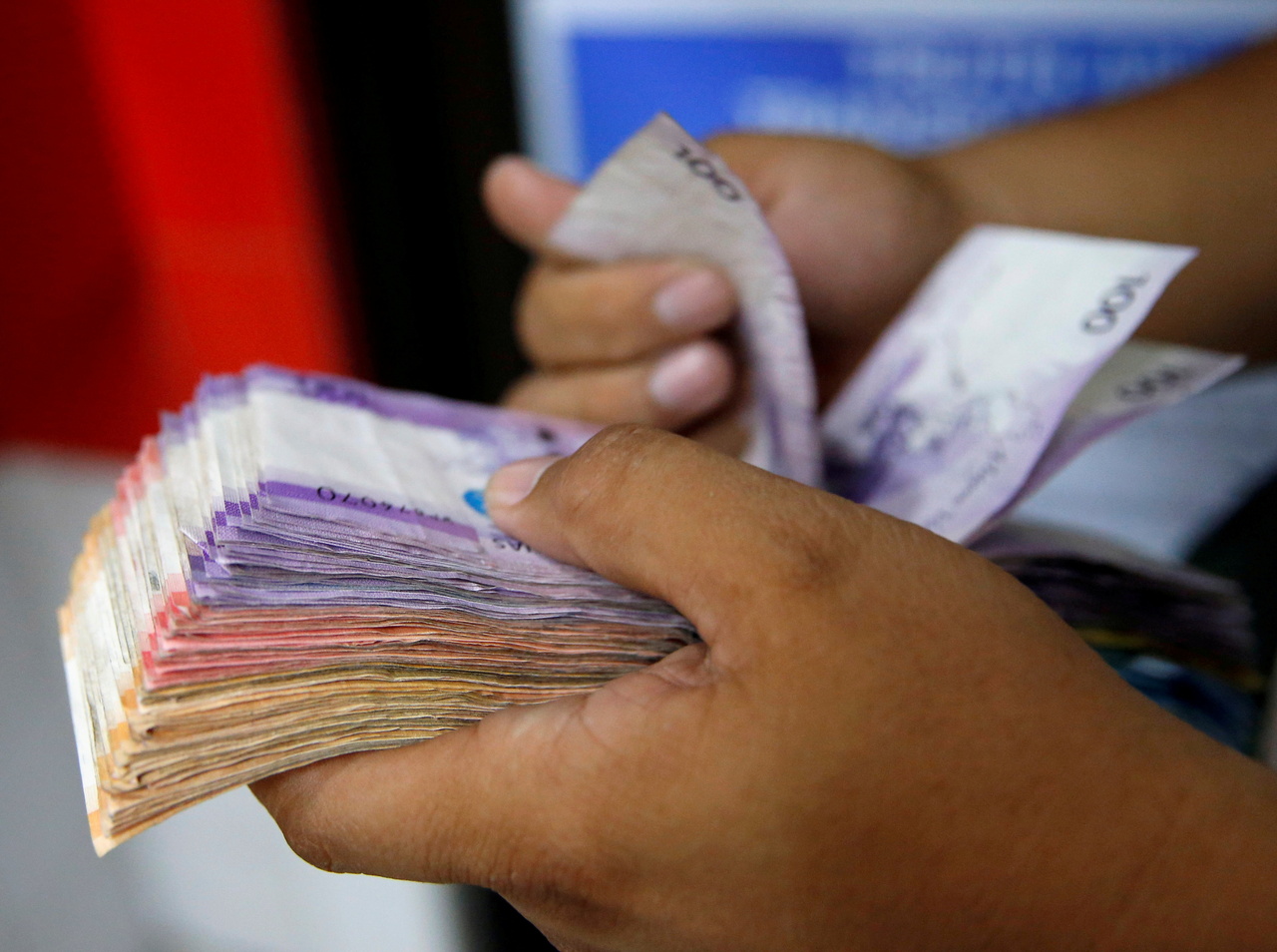Editorial Notes
Tighten dirty money rules: Inquirer
The paper says Philippine legislators and national leader need to approve stricter laws to save the country from being on the Financial Action Task Force grey list.
Sign up now: Get insights on Asia's fast-moving developments

A man counts a wad of Philippine Peso bills at a money remittance center in Makati City, Metro Manila, Philippines on Sept 19, 2018.
PHOTO: REUTERS
Follow topic:
MANILA (PHILIPPINE DAILY INQUIRER/ASIA NEWS NETWORK) - The Philippines is back in the so-called "grey list" of countries under increased international monitoring, because of insufficient policies and laws on-and action against-money laundering and terrorist financing. It joins countries such as Pakistan, Haiti, Malta, and South Sudan in the disreputable list.
This is a sad development, considering that the country had so much time to comply with the requirements of the Financial Action Task Force (FATF), an intergovernmental body started in 1989 by the Group of Seven (G-7) industrialized countries. The body sets the standards and monitors the implementation of measures needed to fight dirty money across the globe and other threats to the international financial system.
The Philippines was first blacklisted by the FATF as a "non-cooperating country" more than 20 years ago. It was delisted in 2005 following the creation of the Anti-Money Laundering Council (AMLC) through Republic Act 9160 (the Anti-Money Laundering Act).
It was on the brink of being blacklisted again in 2012, but was saved by the passage in Congress of RA 10168 (the Terrorism Financing Prevention and Suppression Act). Earlier this year, the Philippines was again warned that it was in danger of being included in the "grey list," but Congress passed RA 11521 to strengthen the country's antimoney laundering law on Jan 29, just two days ahead of the FATF deadline.
Inclusion in the "grey list" is a warning for a country to comply with recommended reforms within a given time frame, or be blacklisted and face financial sanctions from the FATF's 39 member countries. The sanctions include restrictions on trade payments and financing, as well as on currency remittances even of Filipinos working abroad, which would have potential considerable impact on the Philippine economy given its reliance on OFW remittances.
The AMLC said the country must address 18 action points to be removed from the list. The Philippines would have to submit progress reports to the FATF thrice a year, the first to be given this September.
The 18 action items refer to various immediate desired outcomes or key goals in effective antimoney laundering and counter-terror financing that a country should be able to achieve to show that it is effectively implementing pertinent laws and regulations.
The AMLC stressed that the relevant government and law enforcement agencies' sustained pledge to implement the 18 action plans within the prescribed timelines would be essential to the country's removal from the list. It thus becomes imperative for all government agencies involved to deliver on the action plans pertaining to them, and for the government to crack the whip on these agencies to ensure the fulfillment of their deliverables.
"The Philippines will be delisted from the 'grey list' upon successful completion of all action plans-hopefully on or before January 2023," said Bangko Sentral ng Pilipinas governor Benjamin Diokno.
One of the concerns earlier raised by the International Monetary Fund related to the conflicting functions of the state-owned Philippine Amusement and Gaming Corp as both operator and regulator of casinos. Another unaddressed issue is the need to amend the antiquated Bank Secrecy Act.
According to Sen. Panfilo Lacson, the Philippines' inclusion this year in the FATF "grey list" may again be a call to amend the law to finally address a major source of corruption. From his first term as senator in 2001, according to Lacson, he had repeatedly filed a bill seeking to remove bank privacy protection for government officials and employees.
In the 18th Congress, Lacson filed Senate Bill No. 26, which sought to strip public servants of the protection afforded by RA 1405 prohibiting the disclosure or inquiry into bank deposits as a general rule. The bill is still languishing in the committee level.
Since the second Aquino administration, the FATF had warned about certain "strategic deficiencies" in the Philippines' antimoney laundering and antifinancial terrorism measures. In particular, it advised the Philippine government to enact pending legislative amendments to the antimoney laundering law that, among others, would extend the coverage of reporting entities, provide a broader definition of money laundering, and increase the number of predicate crimes to include bribery, malversation of public funds, human trafficking, tax evasion, and environmental crimes.
Herein lies the problem. The called-for amendments would mean the greater scrutiny of public officials and their finances, as well as those who hold the country's intertwined economic and political levers.
Are Philippine legislators and other national leaders up to the task of approving stricter laws that will demand greater transparency from them? Will they manage to overcome narrow self-interests and tighten the rules in time to save the country from the international ignominy of the FATF "blacklist"?
- The Philippine Daily Inquirer is a member of The Straits Times media partner Asia News Network, an alliance of 23 news media organisations.

